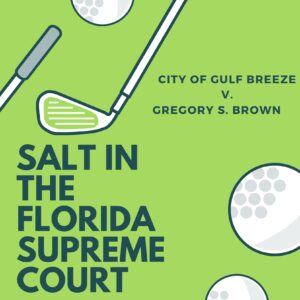

The Florida Supreme Court issued an opinion in City of Gulf Breeze, etc., v. Gregory S. Brown, identifying whether a relationship between a management company and a public golf course was a qualified lease for property tax exemption purposes. Under article VII, section 3(a) of the Florida Constitution, all property owned by a municipality and used exclusively by it for public or municipal purposes is provided an exemption from tax.
The City of Gulf Breeze engaged in a purchase of a golf and country club located next to the city’s water treatment facility. The primary purpose of the property was to dispose of effluent water, or sewage water that is only lightly treated. However, the city was unable to profitably operate the golf course.
In September 2015, the city entered into an agreement with a company to operate and manage the golf course and other facilities on the property, such as a restaurant. Under the agreement, the city retained ownership and control of the property. Further, the agreement expressly disavowed being a lease.
Rather than simply looking at the face of the management agreement, the Florida Supreme Court looked further into the nature of the relationship to identify whether the agreement was a qualifying lease.
Unlike sales and use tax imposition, this case was a property tax exemption under a constitutional provision specifically requiring exclusive control over the property. By turning over even the most minor control of the property over to a management company, it seemed the exemption would be invalidated. This is particularly true because tax impositions are construed in favor of taxpayers while exemptions are construed in favor of taxing authorities.
Although the opinion did not address this specifically, it must be assumed that the management company was provided use of an office or storage facility on the property. If the company was operating the facility, it must have had keys and the ability to access the golf course and other facilities at any time.
Further, rather than be compensated by a fixed fee, the management company was engaged in a profit-sharing arrangement whereby its compensation was tied to the difference between revenue and expenses. This “percentage rent” was structured such that the company was entitled to any profits but was responsible for any financial loss. The responsibility for any loss is a particularly unfavorable fact here because it intertwines the city and company further, shifting more of the responsibility onto the shoulders of the company. From the company’s side, any responsibility for financial loss will require more access and control over the property on their end to protect their own interests.
Regardless of the high exemption standard generally, and specific threshold of exclusivity in this particular exemption, the Florida Supreme Court ruled in favor of the City determining that it ultimately, despite all these factors, retained qualifying exclusive use of the space. The court noted that the City retained control over the operations of the golf course and other facilities through oversight. This oversight consisted of a weekly meeting between the Director of Parks and Recreation and the company. Further, the Court noted the company was not allowed to do anything else on the property other than operate the golf course and related facilities and had certain requirements imposed upon it. This latter point seems consistent with almost any commercial lease, which limits the use of space to the nature of the business and restricts certain activities.
By ruling in favor of the city, the Florida Supreme Court has reinforced longstanding Florida law that the nature of a relationship, including control, use, and intent, must be evaluated in identifying whether any agreement between parties for the use of real property is taxable. However, it also severely limits what types of control, use, and intent, are required for a relationship to rise to the level of a taxable relationship. If the substantial relationship between City and Company in this case did not impact the City’s exclusive use and an exemption qualification, then the bar for taxability has risen considerably. A variety of relationships and interactions between parties can now exist without the concern that a taxable relationship will be identified by courts, particularly in instances where no party intends one, no substantial rights are turned over, and the “landlord” retains, at all times, control of the property.
Property taxes are administered locally in Florida. However, for sales and use tax purposes, the Department of Revenue routinely faces a similar question in identifying whether a qualifying rent, lease, or license transaction occurred for taxability purposes under section 212.031, Fla. Stat. Florida is the only state to impose a state-wide sales and use tax on commercial rent. Therefore, the implications of this case are quite widespread.
In a typical sales tax scenario, a high-end hotel will attract a well-known chef to open a restaurant in their location. As chefs are wont to focus on their craft, a restauranteur will likely partner with them to design and staff this restaurant. Chef and restauranteur will form an entity, Restaurant Inc., and engage in a lease agreement with the hotel. Although Restaurant Inc. is located inside a hotel and manages and operates the restaurant, Hotel retains the right to terminate the relationship at any time, set the hours, hire or fire staff, make changes to appearance or ambiance of the restaurant, control noise or crowds, etc. These relationships are quite unlike a restaurant opening shop in a strip mall or in a stand-alone building. Rather than exercising control of the space, these entities are there to provide a service to the hotel of restaurant management, and there is no question the property is always under the direct control of the hotel.
While a standard landlord and tenant relationship, in which a landlord turns over the keys and vacates the property so that a tenant may operate within the building instead, is clearly a taxable relationship for sales and use tax purposes, there are a variety of business relationships that are more complex than that. The fact that these relationships involve real property, or occur at real property, is not the sole dictating factor of whether a lease, or any agreement, is a qualifying taxable lease. There are further landlord and tenant agreements in which the intent of the parties does not even matter when no control is ever turned over by the “landlord” or no rent is paid pursuant to the lease.
Ultimately, longstanding Florida law supports that agreement terms are not the sole determining factor in identifying whether a taxable rental relationship exists, or in this case, an exemption-terminating relationship. In City of Gulf Breeze v. Gregory S. Brown, the opinion would be one paragraph if that was the case, as their agreement expressly stated it did not create a landlord and tenant relationship. However, consistent with Florida law, the Florida Supreme Court evaluated the nature of the relationship, looking to various facts centered around control, use, and intent, in making their determination.
New to Florida case law, meanwhile, is the expansion of the types of relationships which can exist between two entities without triggering a taxable or exemption-terminating relationship. Even when a management company used and operated the entire golf course, obviously taking control of areas in order to do so, the City was determined to have “exclusive control.” Therefore, going forward, business relationships should have wider berth in crafting agreements that include or occur at real property without fear those relationships will be boxed into a traditional landlord and tenant relationship for tax purposes.
Additional Articles by the SALTy Orange at Moffa Tax Law:
Florida Property Tax Benefits for Active Duty Military and Veterans
Florida Sales Tax Audit – Help!
Florida Department of Revenue and IRS Relief for Florida Taxpayers Affected by Recent Hurricanes
Florida Department of Revenue Adopts 2024 Internal Revenue Code – But What are the New FL Tax Credits?
Understanding Florida’s Sales Tax on Services: Implications and Considerations

Jeanette Moffa, Esq.
Phone: (954) 800-4138
Email: JeanetteMoffa@MoffaTaxLaw.com
Jeanette Moffa is a Partner in the Fort Lauderdale office of Moffa, Sutton, & Donnini. She focuses her practice in Florida state and local tax. Jeanette provides SALT planning and consulting as part of her practice, addressing issues such as nexus and taxability, including exemptions, inclusions, and exclusions of transactions from the tax base. In addition, she handles tax controversy, working with state and local agencies in resolution of assessment and refund cases. She also litigates state and local tax and administrative law issues.


